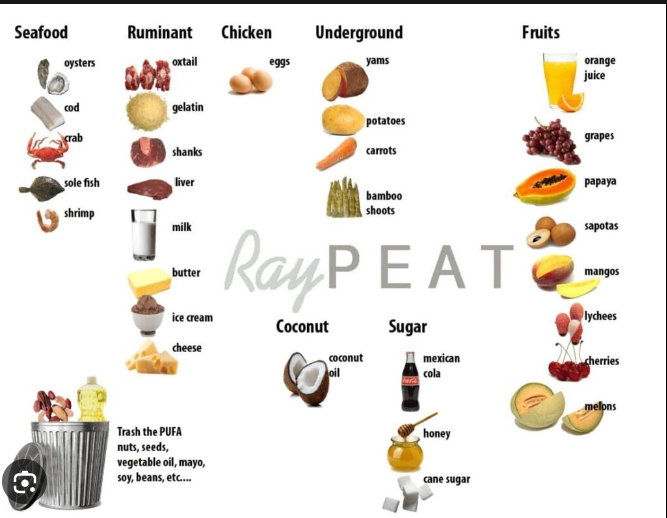Uncertain about the Ray Peat diet but aware of its existence? Find out everything there is to know about the ray peat diet and if it’s something you should try.
Anyone who has ever experienced a persistent, challenging-to-diagnose medical condition knows that the quest for solutions can cause years of frustration. Anecdotal evidence and experimentation can occasionally lead to a sustainable solution for some people in situations where medical science is unable to provide a definitive answer. Follow the ray peat diet.
That was the situation for Benedicte Lerche, a thyroid specialist, nutritional counselor, and biochemist who battled a low thyroid condition in her 20s. She blamed her surroundings for all of her varied, nonspecific symptoms, including headaches, stomach troubles, irregular periods, rashes, low blood sugar, and recurrent fevers and colds. Upon her return from Paris, she anticipated that the symptoms would go away. They didn’t.
Also read-COVID -19 Pandemic : America’s Trust In Scientists Drops In Wake Of COVID-19 Pandemic

As a result, she began seeking help from the medical system. She says her thyroid function levels were a little on the low side “but not alarmingly low,” and her test results were otherwise normal. Frustrated, Lerche turned to the alternative medicine community and came across Ray Peat’s sometimes counterintuitive approach to food and health. She found a phone number and dialed.
“Very luckily, he just grabbed the phone,” she says.
In their correspondence, Peat shared his theories on how to overcome hypothyroidism with the other person. His suggestions enabled Lerche to get rid of her symptoms.
She remembers, “It was such a relief in a lot of ways.”
Motivated by her improved general health and well-being, Lerche went on to complete a PhD in biochemistry. These days, she uses her BiochemNordic platform and a variety of online tools, such as e-books, recipes, and blog posts, to guide other individuals who are dealing with low thyroid conditions toward better health.
What is the Ray Peat Diet?
The problem with the Ray Peat diet is that there isn’t actually one.
Through “pro-metabolic” dietary modifications, the Ray Peat diet “works to correct hormonal imbalances and improve metabolism,” according to Erin Holley, a registered dietitian at the Ohio State University Wexner Medical Center in Columbus. It’s okay if you’re not familiar with that term.

Even those who adhere to his diet are unable to explain it, so Holley is unsure of the significance of this. Peat, who passed away in November 2022 at the age of 86, didn’t publish a book outlining how to eat to improve thyroid function. He also never offered a monthly membership program, cookbooks, recipe lists, or simplified lists of foods to eat or avoid in prescribed amounts, like so many other diets. Most of the information available comes from people other than Peat himself, Holley says, and they aren’t always reliable sources.
“The information I found online came from non-credible people, such as wellness coaches, functional nutrition therapy practitioners, and other followers of his works,” she explains. Still, the Ray Peat diet has many staunch followers, such as Lerche, who’ve found relief in his unconventional ideas—and often through direct contact with the scientist himself. This eating concept draws from Peat’s research and, to a certain degree, is open to interpretation by the user.
Who was Ray Peat?
According to information posted on the Ray Peat website, which is attributed to Peat, he held a PhD in biology with a specialization in physiology from the University of Oregon and taught at several institutions, including the University of Oregon, Urbana University, Montana State University, and the National University of Naturopathic Medicine. He also offered private nutritional counseling.

How much you can eat on the Ray Peat Diet?
Many supporters of the Ray Peat diet don’t think much of portion size because losing weight isn’t the main goal. Essentially, people who follow this diet are not attempting to lose weight; instead, the majority are looking for relief from thyroid or other hormone issues that are either poorly diagnosed or hard to pinpoint. Although weight loss is a potential benefit of the Ray Peat diet, it is rarely the primary motivator.

Focus on the red light.
The Ray Peat approach also includes light therapy, which focuses on red light as a potential anti-stress mechanism that may promote longevity and lessen aging-related cellular degradation.
Peat has proposed that red light, a component of sunlight, can readily permeate tissues and promote healing. He contends that living in a dimly lit space with little sunlight can be harmful to one’s health. Lerche continues, “It might be worthwhile to invest in a light therapy machine to raise your levels if you live in an area where you can’t get enough sunlight on a daily basis.”
Is there science to back up the Ray Peat Diet?
Peat has conducted research on hormones and the impact of diet on them as a scientist. Although there is some evidence supporting these theories, conventional nutritional advice does not always include these ideas. Furthermore, it’s unclear if the anecdotal findings made by some believers are genuinely attributable to the diet.

Despite the lack of evidence to back up some of the assertions made by proponents of the Ray Peat method, Holley states, “I do not believe these foods to be harmful either.” The Ray Peat diet, like many other unconventional diets, combines sound advice with dubious nutritional concepts. The Ray Peat carrot salad, which went viral on TikTok, is one that Holley mentions. Some who eat the salad say it balances hormones, including estrogen. “Please don’t let this fool you. Carrots are good for you, but they don’t balance hormones, according to Holley.
Should i try the Ray Peat Diet?
Bottom line, this approach isn’t necessarily bad or wrong, but if you have thyroid issues, it’s important to seek advice from a medical provider. There are treatments available for hypothyroid conditions that don’t require completely revamping your diet or vastly upping your intake of orange juice.

“I really don’t think any of these foods are bad or wrong to include in your diet,” Holley says. “But I would not recommend limiting oneself to only the foods that are part of this diet.”
In the end, the best thing for people is to eat a well-balanced diet with a variety of healthy, whole foods.
Also read-Using Food AS Medicine : Using Food As Medicine ,For Good Health And Healthy Lifestyle
images source: Google
Disclaimer: The opinions and suggestions expressed in this article are solely those of the individual analysts. These are not the opinions of HNN. For more, please consult with your doctor.




































